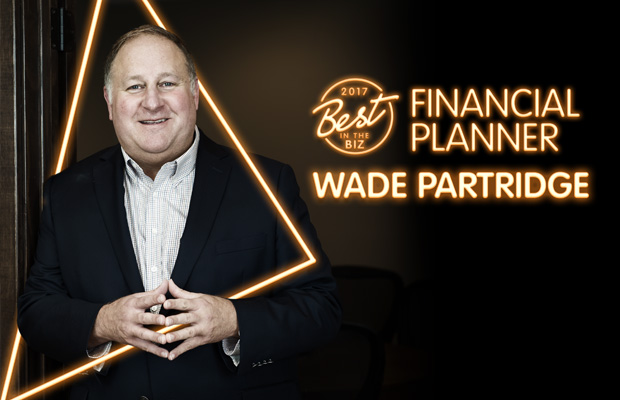Best in the Biz 2017 – Financial Planner

We’ve all heard the adage, “Slow and steady wins the race.” After spending half an hour with Wade Partridge, president of Pear Tree Wealth Management, LLC, you might think it originated with him.
“We’re not day traders, aggressive stock or commodities traders. We’re probably a little more boring than that,” he said. “We try to manage conservative portfolios to help our clients reach their long-term goals, whether it’s funding a college education, a comfortable retirement or planning their legacy for future generations.”
Partridge says he was fascinated by stock markets from a young age, and shortly after turning 21, made the decision to pursue it as his life’s work.
“I wrote down five things I could see myself doing for the rest of my life,” he said. “In the end, one of the top five was to be a financial advisor. I’ve always believed that the process of investing and building wealth was one that’s genuinely American.”
After talking to industry professionals and picking their brains for advice, Partridge got his opportunity. “I remember clearly; my first job was with Bob Bass, the branch manager at Dean Witter. He taught me that [wealth management] was as much a people business as it ever was an investment business.”
And those lessons stick with the 49-year-old Benton native, and Pear Tree Wealth Management vice president, Miki Morrow, today.
“If all I did was buy and sell stocks for people, that would not be exciting to me,” he said. “It’s the relationships; sometimes I think our best work is done managing the client, their risk profile, and their expectations.
“A lot of what we do is based on communication, more time spent explaining, counseling,” he added. “Sometimes it’s handholding when the markets are down 20 percent. Sometimes it’s explaining to people that markets go through inevitable cycles, with clear ups and downs.”
Partridge says his team’s approach to wealth management may not be sexy, but it is effective for those who develop and remain committed to their plan. He insists you won’t hear the fast-talking analysis as you do from panelists and commentators on CNBC.
“They’re geared more for traders than investors, and it’s presented like there’s an inside game or a secret that you don’t get to be part of,” Partridge said. “Remember: the advertisers on CNBC are more interested in the velocity of your assets than the growth of your assets. If someone sits around all day watching CNBC, that screen looks more like something you would see in a casino than a roadmap for how we’re going to get your granddaughter to college.”
“I try to read something from Warren Buffett every day,” he said. “What he talks about is buying good quality companies and holding them forever, making sound decisions and hiring good managers. Those ideas best align with our company’s principles.”
What’s even more impressive, Partridge says, is that in his experience, the wealthiest people usually don’t end up being the most famous. “They’re just smart, disciplined people who have invested in their 401(k) for 40 years.”
“We pride ourselves on being soup-to-nuts in financial services, comprehensive wealth management. We’re trying to build deep, multi-generational relationships with the clients we serve.”
Advisory Services are offered through Sowell Management Services, a registered investment advisor.
The views expressed represent the opinion of Sowell Management Services, a Registered Investment Adviser. This material is for informational purposes only. It does not constitute investment advice and is not intended as an endorsement of any specific investment. Stated information is derived from proprietary and nonproprietary sources that have not been independently verified for accuracy or completeness. While Sowell Management Services believes the information to be accurate and reliable, we do not claim or have responsibility for its completeness, accuracy, or reliability. Statements of future expectations, estimates, projections, and other forward-looking statements are based on available information and the Sowell Management Services’s view as of the time of these statements. Accordingly, such statements are inherently speculative as they are based on assumptions that may involve known and unknown risks and uncertainties. Actual results, performance or events may differ materially from those expressed or implied in such statements. Investing in equity securities involves risks, including the potential loss of principal. While equities may offer the potential for greater long-term growth than most debt securities, they generally have higher volatility. International investments may involve risk of capital loss from unfavorable fluctuation in currency values, from differences in generally accepted accounting principles, or from economic or political instability in other nations. Past performance is not indicative of future results.









0 comments